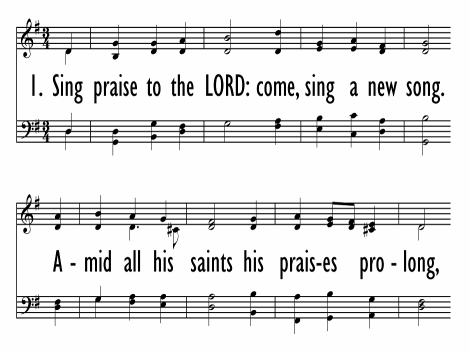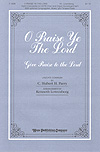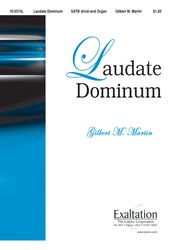- |
User Links
Give Praise to Our God
Hymn Information
- First Line
- Give praise to our God and sing a new song
- Text Source
- <cite>Psalter</cite>, 1912, alt. 1995
- Tune Name
- LAUDATE DOMINUM
- Composer
- C. Parry H. Hubert (1894)
- Topic
- Elements of Worship: Praise and Adoration
Copyright Information
- Text Copyright
- Public Domain
- Tune Copyright
- Public Domain
- Reprint/Projection Information
- Words and Music: The Words and Music are in the Public Domain; you do not need permission to project or reprint the Words and Music.
Full Text
Scripture References
Further Reflections on Scripture References
See how Psalm 148 is the primary reference, but a similar thought is found in Psalms 8, 33, 104, and 135. In addition, God’s provocative questions to Job in Job 38-41 aim to stir similar praise, awe and humility. However, back in Genesis 1 and 2 we are motivated to do the same.
Confessions and Statements of Faith References
Further Reflections on Confessions and Statements of Faith References
Sometimes the soul of the Christian needs to cry out exuberantly with joy, thanks, and adoration, even without identifying the reasons for such praise and adoration. Moreover, Christians who gather corporately find it fitting to do so as the grateful body of Christ. The Confessions of the church recognize this natural expression. Belgic Confession, Article 1 sees God as the “overflowing source of all good,” and such a realization deserves an “Alleluia!” Heidelberg Catechism, Lord’s Day 1, Question and Answer 2 is a reminder that living in the joy of our comfort involves a spirit of thanks for his deliverance. In the same spirit, Our World Belongs to God, paragraph 2 exclaims, “God is King: Let the earth be glad! Christ is victor: his rule has begun! The Spirit is at work: creation is renewed!” and then as a natural response cries: “Hallelujah! Praise the Lord!”
Give Praise to Our God
Additional Prayers
Give Praise to Our God
Tune Information
- Name
- LAUDATE DOMINUM
- Key
- B♭ Major
- Meter
- 10.10.11.11


 My Starred Hymns
My Starred Hymns





